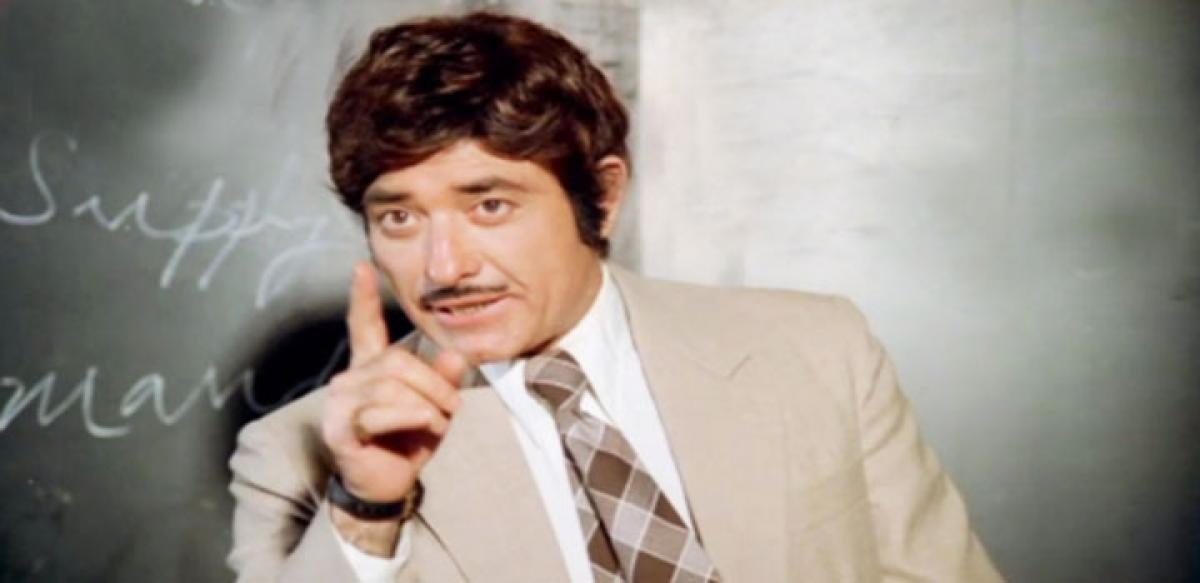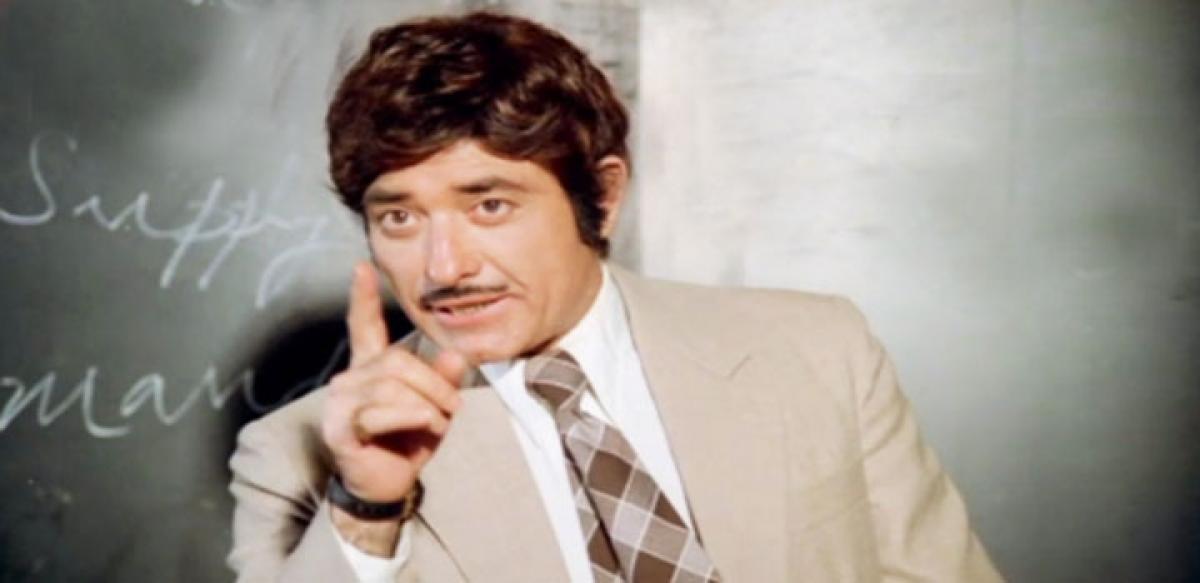Live
- NASA Tracks Five Giant Asteroids on Close Approach to Earth Today
- Pushpa 2 Hits ₹1000 Crore in 6 Days: How It Compares to Other Top Indian Films
- Vivo X200 and X200 Pro Launched in India: Price, Specifications, and Features
- Nitin Gadkari Admits Feeling Embarrassed at Global Summits Over Rising Road Accidents in India
- Comprehensive Review on Indiramma Housing Survey and Welfare Initiatives Conducted via Video Conference
- Jogulamba Temple Records Rs 1.06 Crore Hundi Revenue in 150 Days
- Opposition Slams ‘One Nation, One Election’ Bill as Anti-Democratic; BJP Allies Support the Move
- Celebrate Karthigai Maha Deepam Virtually with Sri Mandir’s LIVE Darshan Experience
- BJP Extends Support to Samagra Shiksha Abhiyan Employees' Strike, Demands Immediate Regularization and Welfare Benefits
- Dr. M. Priyanka Stresses Quality Education, Nutritious Meals, and Cleanliness in Schools
Just In

The 1980s saw television become a happy hunting ground for ideas that would have ideally spawned unusual films and amongst the genres the student film appeared to be the ideal fit. The decade saw two memorable series in the form of ‘Subah’ (1987) and ‘Chunauti’ (1987) and films like ‘Holi’ (1984) and ‘In Which Annie Gives It To Those Ones’ (1984) that featured the first appearances of Aamir and Shah Rukh Khan respectively.
‘Bulandi’ (1980) is a rare mainstream Hindi masala film that begins on a particular note before transcending into another and still doesn’t ruin the harmony

The 1980s saw television become a happy hunting ground for ideas that would have ideally spawned unusual films and amongst the genres the student film appeared to be the ideal fit. The decade saw two memorable series in the form of ‘Subah’ (1987) and ‘Chunauti’ (1987) and films like ‘Holi’ (1984) and ‘In Which Annie Gives It To Those Ones’ (1984) that featured the first appearances of Aamir and Shah Rukh Khan respectively.
The genre also enjoyed a great run in mainstream cinema in the mid-1980s with ‘Arjun’ (1985) and ‘Ankush’ (1986) but unlike ‘Mere Apne’ (1971), perhaps the first mainstream film to have students at the forefront, both the films dealt with larger issues. In that sense, ‘Bulandi’ (1980) was closer to the traditional format of the student film and yet managed to intriguingly merge it with typical popular Hindi cinema elements, which always run the risk of making a hash of things.
‘Bulandi’ is essentially a mainstream film with art-house and even independent sensibilities and this is evident from the very first frame of the film. Vikram (Raj Kiran) is the leader of students, who are protesting – it’s not important to know what or who they are complaining against – and things reach a point of no return when one of the professors throws Vikram out of the class when he wants to address them in the middle of the lecture.
Vikram tells the professor that once the college ends for the day he’d deal with him and then at 5 pm a stone is hurled into the staff room. The next sequence is as filmic as things can get within the realm of popular Hindi cinema. The camera follows a pair of feet walking out of the staff room to where Vikram’s camped, the man to whom these feet belong is Prof. Satish Khurana (Raaj Kumar) and he explains to the students to return peacefully to their rooms as the administration would look into their demands.
While most of the students walk away as Khurana’s word is enough for them, Vikram continues to hold the fort but gives in once Khurana fights the college’s principal and stops the police from arresting the students. Khurana argues that youth need direction and sending them to the lock-up would scare them forever from which they might never recover. The two sequences show the contrast within ‘Bulandi’ and this is distinction that director Esmayeel Shroff maintains throughout the film.
Bulandi’s mainstay is the manner in which Khurana is played by a cabal of gangsters led by Ranjit Singh Lobo (Danny Denzongpa) to get him to help their spoilt children get back on the right track but this is just a front. They want the respected professor be the front of an operation to convert their illegal activates into white. Khurana is superseded at work and the humiliated professor can’t get himself to continue in the college and ends up taking up the assignment to tutor Lobo’s son Manjit (Danny, in a double-role).
Manjit might be spoilt to the core but has a few good qualities such as respecting elders and values time that endear him to Khurana. Once Ranjit undergoes a change Lobo’s partners Bhakri (Jeevan) and Teja (Kader Khan), too, send their sons Pawan (Rakesh Bedi) and Vikram to the professor. Things change for the boys, who discover a teacher who not only understands them but also allows them to express themselves freely.
Manjit tops his college and falls in love with Leena (Kim), Khurana’s sister, and even Sarla (Asha Parekh), Khurana’s wife, who initially suspected the boys have warmed up to them. In Khurana, Lobo too, finds an unlikely kindred spirit and decides to give up the way of crime but Teja kills him before he could go to the police. The boys join Khurana and together they then take on the syndicate led by Teja.
‘Bulandi’ is many things at the same time. It’s a student film, it’s the story of an upright man, who knows the system might be flawed but hasn’t lost hope in it, it’s about fathers who spoil their sons silly, it’s about children who know no matter what they do they’d never be able to match their parents’ sacrifices et al. Additionally the film’s plot resembles a connect the dots worksheet but the narrative has many interesting set-pieces and some wonderful moments which make it worthwhile.
Lobo and Teja playing chess with real people posing as pieces, Khurana asking Vikram to describe what he saw when a girl walks into the class and using his detailed description as an example to prove that his concentration might be misguided but functioning fine, and a couple of sweet RD Burman tunes particularly “Kaho kahan chale” (Kishore Kumar, Asha Bhosle, lyrics: Majrooh Sultanpuri) are enjoyable but the eminent pleasure of the watching ‘Bulandi’ lies elsewhere.
The unmitigated fact that makes this film worth your time are the crackling Raj Kumar dialogues that include “Humko mita sake zamane mein nahin, hum se hai zamana zamane se hum nahin”, “Hukm leta nahin deta hai professor”, and “Jab sar par burre din mandraate hai ... toh zabaan lambi ho jaati hai.”
Written by Moin-ud-din, the lines are still remembered by fans and almost every character gets a bevy of great once-liners such as Danny’s “Baadalo aur insaan ki saanso ka kya bharosa ... baadal kabhi bhi baras sakte hai ... saans kabhi bhi toot sakti hai.”
‘Bulandi’ isn’t one of the greatest Hindi films ever made neither is it an undiscovered or an underappreciated gem. Rather it’s exactly kind of campy Hindi film that makes a day better and life a little more bearable.
Gautam Chintamani is the author of the best-seller ‘Dark Star: The Loneliness Of Being Rajesh Khanna’ (HarperCollins, 2014) / tweet him -@gchintamani

© 2024 Hyderabad Media House Limited/The Hans India. All rights reserved. Powered by hocalwire.com







